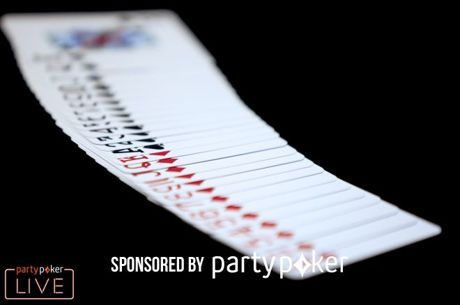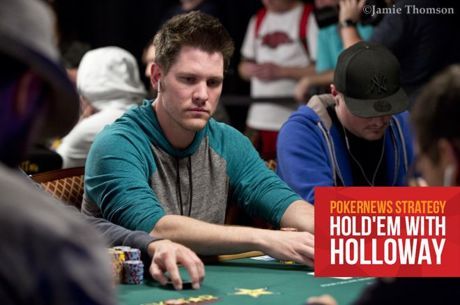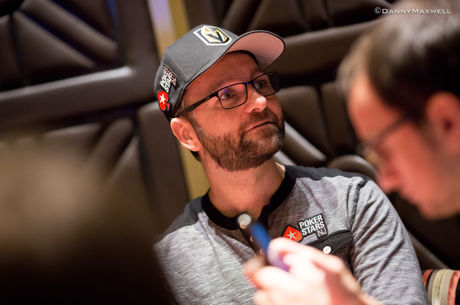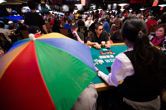Psychic Powers at Play in Poker?
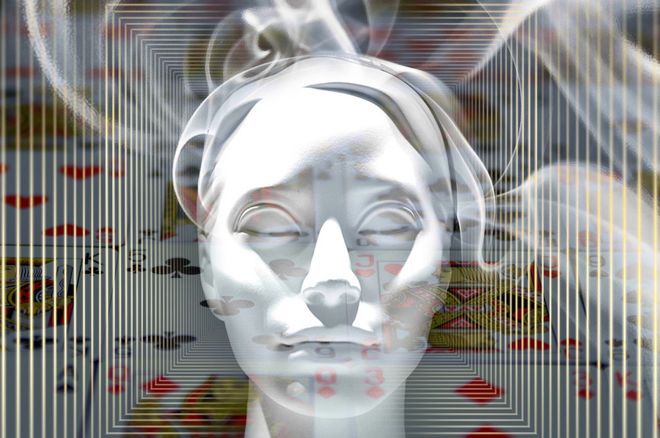
I sometimes ask fellow poker players which psychic power they'd rather have, clairvoyance (knowing what cards will appear on the flop, turn, and river) or telepathy (the ability to know the cards held by their opponents).
The question usually gets a conversation going, at the very least. It surely contributes to my goal of having fun at poker.
The subject invariably leads to further questions about whether either power exists. There have been many claims of psychic ability. If it were to exist, might it be possible to use it to your advantage at the poker table?
Before you dismiss the topic out of hand, consider this. Doyle Brunson and many others have stated their belief in psychic abilities. Uri Geller achieved almost cult status and received widespread attention from the mainstream media (including an article about him in Nature) for his apparent demonstration of psychokinesis, the ability to move and alter physical objects with his mind, and of remote viewing, the ability to see objects not within his physical line of sight.
Scientists Harold Puthoff and Russell Targ, working with the Stanford Research Institute and later the Science Applications International Corporation, both studied psychic phenomena. In fact, they carried out research funded by NASA and the CIA. After considerable investigation, Puthoff and Targ actually announced to the world at a conference in Switzerland that they had proven the existence of psychokinesis!
Contemporary author Sunil Padiyar has written a couple of books on the subject, fully embracing the ability of a poker player to employ psychic powers to augment his chances of winning. Here's part of the description of his book Psychic Poker:
Human beings possess a subtle energy field that envelops the physical body. When activated, it is capable of manufacturing luck and producing remarkably accurate powers of intuition and foresight. Beneath the deceptive fabric of everyday reality, energy fields, continually wage wars to determine who 'gets lucky.' Individuals who possess active energy fields will dominate those with passive energy fields. How can you activate your energy field and put it to use at the poker table? The book provides the answers... present[ing] practical techniques to harness psychic powers and put them to use in winning at the poker table.
To a person used to dealing with reason and the knowable universe, this all sounds ridiculous �� even fraudulent �� little more than relying on superstition and the supernatural to sell a poker book. But before we reach a final conclusion, let's look specifically at what Doyle Brunson once wrote about ESP and poker in Super/System:
I believe some good Poker players actually employ a degree of extrasensory perception (ESP). While I've never studied the subject in depth, it seems to me there's too much evidence to ignore that ESP exists or that most people have it to some degree. Everybody has had the experience of riding with someone else in an automobile and thinking of a song, then being surprised to hear his companion start singing that very song.
As proof of the existence of ESP, Brunson goes on to recount how he has been able to predict the exact cards that his opponent held.
I don't doubt Brunson's right about what he and others have experienced. But these experiences can be explained logically, and without the existence of any psychic powers.
The brain can absorb many things below the level of consciousness. Cards exposed during the gathering of the deck, patterns seen in prior deals, and a rudimentary understanding of shuffle tracking may all combine in our subconscious to give our brains some knowledge of the cards to come that could perhaps appear to be clairvoyance. Similarly, a skilled reading of "tells" can seem to be a psychic reading of an opponent's hand, though it isn't.
Selective memory also accounts for much that may be confused with psychic phenomena. Many of us have indeed had an experience of knowing something was going to happen and then having it happen, including what card was going to hit the river.
But so, too, have we each had many experiences of "knowing" that something was going to happen, and then not having it happen. That occurs so often that it's not memorable. But when what we thought would happen did happen, that becomes extremely memorable. Hence, we remembered it, and might have thought it was proof that we were psychic. But it wasn't. It was just selective memory.
The most celebrated debunker of psychic phenomena is the magician James Randi. He has offered $1,000,000 to anyone who can genuinely demonstrate psychic ability. No successful claimant has ever come forward.
It is simple to conclude that since no one ever successfully claimed this prize by demonstrating any psychic ability, that no one with such ability exists. Indeed, thanks at least in part to Randi's rigorous debunking, the scientific community has largely dismissed those earlier studies conducted by Puthoff and Targ. In retrospect, their studies were discounted due to a lack of strict adherence to scientific methodology.
Even so, I am left with an unanswered question. If someone possessed psychic powers, would even $1,000,000 in cash entice that person to come forward? Wouldn't a poker player, able to psychically know opponents' cards or predict accurately which cards were going to come off the deck, do everything in his power to hide this ability so he could continue to use it undetected in the future? Surely the person wouldn't blow his or her cover by submitting to any public test, no matter the prize.
So what do you think? Are psychic powers real?
Wait... don't tell me. I think I know what you're going to say.
Ashley Adams has been playing poker for 50 years and writing about it since 2000. He is the author of hundreds of articles and two books, Winning 7-Card Stud (Kensington 2003) and Winning No-Limit Hold'em (Lighthouse 2012). He is also the host of poker radio show House of Cards. See www.houseofcardsradio.com for broadcast times, stations, and podcasts.

